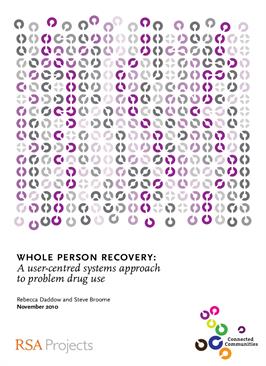As we enter a period of scarcity in terms of public finances, employment and opportunity, this will have significant implications for the individuals and communities already experiencing the realities of problem drug and alcohol use. Further, those often associated with disadvantage, debt and wider socio-economic exclusion will also face implications.
This report touches on the link between unemployment, lack of opportunity, problem drug and alcohol use and crime. With the likelihood of increased job cuts and a tightening of state support, what does this mean for those who already struggle to find opportunities in their communities?
Some of the key findings include the emerging theory of Recovery Capital - the sum total of personal, social and community resources that someone can call on to aid their recovery – provides a more holistic foundation on which to develop strategies that can spark and sustain recovery.
Social innovations examined in the report include: giving users modest grants to assist their recovery; a peer led dedicated radio services; and a user led training package for local GPs.
A systems based approach to understanding, mapping and visualising users’ experiences can help harness all the assets available to aid recovery for a given person.
Recovery is 'contagious' – users should be part of networks of people who have or are recovering from problematic drug and alcohol use and those people that support recovery such as non-using family and friends.
There needs to be a collective response to recovery, primarily in the form of 'recovery communities'. A change in public attitude to the recovery and well being of problem drug and alcohol users is of fundamental importance to generate a collective response to the opportunity that a whole person recovery approach presents.
The recommendations of this report are as follows:
- Strategic, theoretical and political shifts.
- The value of user-centred and systems approaches to service design.
- Involving drug and alcohol users more directly in the design of services is not only ethical, but substantially increases the likelihood of services targeting resources where they are most likely to have a meaningful impact on an individual’s recovery.
pdf 10.5 MB
Contributors



Be the first to write a comment
Comments
Please login to post a comment or reply
Don't have an account? Click here to register.